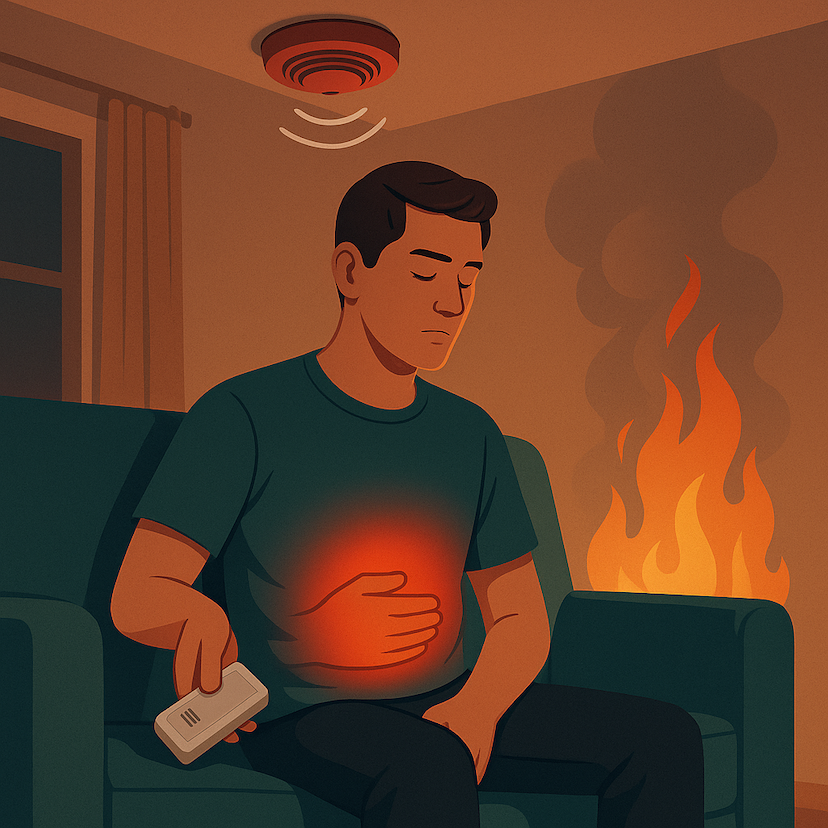Imagine you’re chilling at home, and suddenly the fire alarm goes off. Instead of checking for smoke, you just yank out the batteries and go back to whatever you were doing. The fire’s still burning—but hey, at least the noise stopped.
That’s pretty much how a lot of us deal with stomach pain. We feel that burning, cramping, or discomfort, and reach for an antacid, a painkiller, or just try to ignore it. But the cause? That could be anything—bacteria, stress, food sensitivities, or even something chronic. Treating it the same way every time doesn’t help, and can actually make things worse.
Way before modern science discovered the gut-brain connection or realized the stomach produces most of our serotonin (Gershon, 1998), ancient Arabic medicine had a saying: "المعدة دار الداء و الدواء" — "The stomach is the house of illness and remedy" (Ibn Sina, 1025). They were seriously onto something.
Same Pain, Different Story Stomach pain isn’t a diagnosis—it’s a warning sign. And that warning could mean a ton of different things: ulcers, IBS, food intolerance, stress, or something else entirely.
The problem is, a lot of those feel the same on the surface. So people lump them together and treat them with the same quick fix. But every cause needs its own kind of care.
The Fire Alarm Analogy Think of pain like a fire alarm. It's there to get your attention, but it doesn’t tell you what started the fire. Taking a pill might stop the noise, but if the fire’s still going, it’s only a matter of time before things get worse.
In real life, this means painkillers might make you feel better short-term, but if you’re not figuring out why you're hurting, the real issue just keeps simmering under the surface.
Your Gut Is Way Smarter Than You Think The gut isn’t just a food processor. It’s wired up with its own nervous system—sometimes called your "second brain."
Around 95% of your serotonin (the feel-good chemical) is actually made in your gut.
The gut and brain are constantly chatting—it’s a two-way street.
And yeah, stress can seriously mess with your gut (Mayer, 2011).
So if you’ve ever felt stomach issues during a tough week, anxiety, or emotional burnout, that’s not in your head—it’s in your gut and your head. They’re connected.
Old-School Wisdom Meets Science Ibn Sina (Avicenna), a legendary physician from over a thousand years ago, nailed it with this line: "The stomach is the house of illness and remedy."
Modern medicine is catching up. Fields like functional medicine and psychoneuroimmunology now explore how the gut, brain, and immune system are all part of the same puzzle.
The Takeaway: Don’t Just Mute the Signal Yeah, stomach pain happens. But it’s never something to brush off. It's your body trying to tell you something.
If you treat every stomach issue with the same fix, it’s like trying to put out every fire with a fan—it might give temporary relief, but the real problem only gets bigger.
So next time your gut acts up? Don’t just silence it. Listen. Ask why. Your stomach’s not just making noise—it’s dropping hints.
References
Gershon, M. D. (1998). The Second Brain: A Groundbreaking New Understanding of Nervous Disorders of the Stomach and Intestine. HarperCollins.
Mayer, E. A. (2011). Gut feelings: the emerging biology of gut-brain communication. Nature Reviews Neuroscience, 12(8), 453-466.
Konturek, P. C., Brzozowski, T., & Konturek, S. J. (2011). Stress and the gut: pathophysiology, clinical consequences, diagnostic approach, and treatment options. Journal of Physiology and Pharmacology, 62(6), 591-599.
Ibn Sina (Avicenna). (1025). The Canon of Medicine
